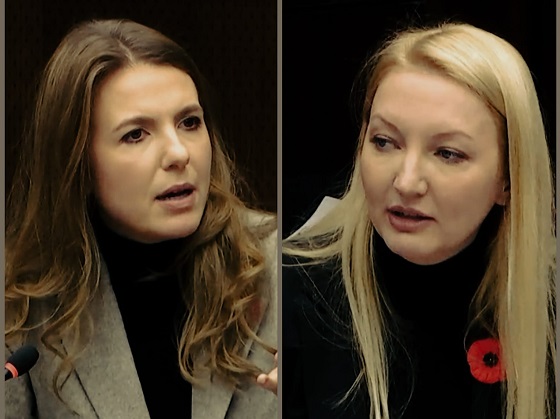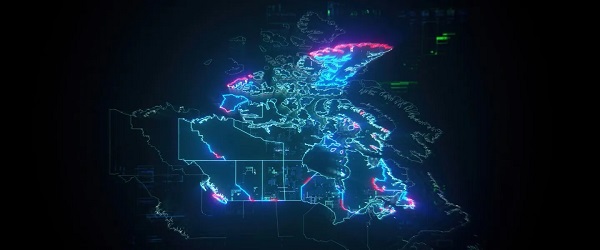National
Committee Hearing Exposes Trudeau’s Political Spin on Foreign Interference

In a Circus of Leaks, Double Standards, and Evasions, Conservatives Call Out the Trudeau Government for Putting International Optics Over Canadian Sovereignty
In Canada’s recent hearing with the Standing Committee on Public Safety and National Security (SECU) on alleged interference by Indian government-linked agents, what should have been a serious inquiry into national security turned into a Liberal-led circus of deflections, double standards, and selective outrage. The Trudeau government trotted out high-ranking officials—representatives from CSIS, the RCMP, the Privy Council Office, and Global Affairs Canada—who were there to answer for the alleged interference tactics targeting Canadians. And to top it off, they were asked why, instead of informing Canadians directly, they’d chosen to leak the intel to The Washington Post. Why were Canadians the last to know about threats on their own soil? And why did a foreign newspaper get the scoop on a story affecting Canadian sovereignty?
At issue were allegations that Indian agents had been involved in intimidation tactics and organized criminal activities targeting Canada’s Sikh community, particularly those sympathetic to the separatist movement. The committee also questioned why the Trudeau government’s response has been to selectively leak this information to American media, while keeping Canadians in the dark about similar threats from other foreign governments—particularly China.
The Leaks to The Washington Post: Information for Foreign Press, Silence for Canadians
Instead of informing Canadians directly, the Trudeau government decided it was a better idea to leak details about alleged Indian interference to The Washington Post, claiming it was to combat “misinformation” internationally. Let’s pause for a moment—this is Canada we’re talking about, and the government feels it’s necessary to share news about threats to Canadians with foreign media instead of Canadians themselves. That selective leak didn’t go unnoticed by Conservative MPs, especially Raquel Dancho. Dancho took the PCO to task, asking why, when it’s Indian interference, they rush to get the word out to American media, but when it comes to Chinese interference, they hide behind “national security.” Canadians watching this hearing saw the hypocrisy plain as day.
Then enter Jennifer O’Connell. She wasn’t there to press for answers—she was there to protect the government narrative. Instead of holding the PCO accountable, O’Connell fed them a lifeline with soft, scripted questions. She was practically giving them cue cards. She asked them to “explain” the reasoning behind the leak to The Washington Post, letting the PCO offer up the excuse of “controlling the narrative.” Controlling the narrative? You don’t say. Jennifer O’Connell might as well have been reading from a Liberal Party talking points memo, trying to dress up a blatant international PR stunt as a move to protect Canadians.
But here’s where it falls apart. Dancho’s challenge was clear: if the Trudeau government had no problem leaking intel on India to The Washington Post, why do they stay silent on the Chinese interference claims that have rocked our elections? Why are Canadians kept in the dark when it doesn’t suit the Liberals’ image? This isn’t national security; this is political convenience, plain and simple.
Conservatives Call Out Liberal Spin and Selective Transparency
Raquel Dancho didn’t mince words, asking why the government leaks intelligence on Indian interference to American media yet hides CCP-related interference under a “national security” guise.
“I wish that the Liberal members would apply that same energy to holding their own Prime Minister accountable for failing to stop interference into our elections,”
She said, calling out the hypocrisy point-blank. Dancho’s comments exposed the Liberals’ inconsistent approach to foreign interference and questioned why the government continues to treat Canadians like afterthoughts.
Glen Motz zeroed in on the glaring gaps in Canada’s vetting process for foreign diplomats, particularly those from India. He pointed out that expelling diplomats means nothing if their replacements are allowed to enter without adequate security checks. Motz’s questions cut to the core of the Liberals’ “tough on interference” stance, revealing it as hollow when diplomats allegedly linked to interference can come and go unchecked.
Dane Lloyd challenged the government’s decision to leak information to The Washington Post rather than informing Canadians directly, highlighting a fundamental question: Why does the Canadian government prioritize international press over its own people? His frustration echoed what many Canadians feel—that their government is more interested in protecting its image on the world stage than ensuring Canadian sovereignty and safety.
The Bottom Line
This SECU Committee hearing confirmed the worst fears of Canadians: the Trudeau government is more interested in international optics than national security. The Liberals pick and choose which foreign threats to publicize, conveniently spinning some stories while keeping others under wraps—all based on what best serves their political agenda. If this is the government’s idea of protecting Canadian sovereignty, it’s no wonder Canadians are left questioning their safety.
And here’s where the Liberal hypocrisy hits new lows: instead of owning up to their failures, they tried to spin it, suggesting that Pierre Poilievre is somehow responsible for the foreign interference threats that have emerged on Trudeau’s watch. But let’s be real—if the Liberals had names of Conservative collaborators in interference plots, we all know they would be the first to name or leak them to the press. Instead, the Privy Council Office’s actions and The Washington Post leak were backed by none other than Trudeau’s own Prime Minister’s Office.
Conservatives like Raquel Dancho, Glen Motz, and Dane Lloyd came prepared to call out this hypocrisy. They demanded transparency and accountability—the very things Trudeau’s government seems reluctant to provide. This wasn’t a hearing on foreign interference; it was an exposé on the Trudeau government’s shameless double standards and lack of genuine concern for Canadian sovereignty.
In Canada’s darkest hours, when it comes to defending our sovereignty, it’s clear that it’s the Conservatives—not the Liberals—who are standing up for Canadians, demanding the truth, and holding this government to account. Trudeau’s Liberals have shown they’ll trade Canadian security for political optics, undermining everything Canada stands for. And Canadians deserve so much better.
Invite your friends and earn rewards
Business
Man overboard as HMCS Carney lists to the right

Steven Guilbeault, Heritage Minister and Quebec lieutenant, leaves cabinet this week with his chief of staff, Ann-Clara Vaillancourt. He resigned on Thursday.
Steven Guilbeault’s resignation will help end a decade of stagnation and lost investment.
Steven Guilbeault’s resignation will come as no surprise to Mark Carney – save, perhaps, for the fact that it took so long.
The former environment minister quit on Thursday evening, after the prime minister unveiled his memorandum of understanding with Alberta premier, Danielle Smith. That deal is aimed at creating the conditions to build an oil pipeline to the West Coast and encouraging new investment in the province’s natural gas electricity generation sector. In doing so, Carney cancelled the oil and gas emissions cap and the clean electricity regulations that Guilbeault had been instrumental in constructing and imposing.
Fly Straight is a reader-supported publication.
To receive new posts and support my work, consider becoming a free or paid subscriber.
The former environmental activist couldn’t accept the continued expansion of fossil fuel production and so walked away after six years in cabinet.
In his resignation statement, he said he strongly opposes the MOU with Alberta because it was signed without consultation with the province of British Columbia and First Nations.
He said removing the moratorium on oil tankers off the West Coast would increase the risk of accidents and suspending clean electricity regulations, which blocked new gas generation, will result in an “upwards emissions trajectory”.
In particular, he was upset about the expansion of federal tax credits to encourage enhanced oil recovery, a carbon storage technology that captures carbon dioxide from industrial emitters and injects it back underground. Guilbeault considered this a direct subsidy for oil production – a business he said he hoped the government was exiting.
In a Twitter post, I called Guilbeault “anti-Pathways” – that is, opposed to the giant carbon capture and storage development that Carney views as crucial to offsetting the building of a new pipeline.
One of Guilbeault’s defenders said he is not anti-Pathways, and that, in fact, he was part of the trifecta, along with Chrystia Freeland and Jonathan Wilkinson, who negotiated the details on the investment tax credit “that will pay 50 percent of the cost of construction to a bunch of rich oil companies”. To me, that showed Guilbeault’s (and his supporters) true colours. If he wasn’t anti-Pathways, he certainly wasn’t pro.
When he said he would back Carney’s leadership bid in January, I wrote that it was an endorsement the aspiring Liberal leader could do without.
The now-prime minister always had in his mind a plan to build, including fossil fuel production, offset by technology adoption and a stronger industrial carbon price in Alberta. Even then, he made clear he was prepared to be pragmatic in a time of crisis.
Guilbeault’s plan was to regulate the industry to death.
It was always going to end badly but, as Carney told me last winter, Guilbeault provided crucial support on the ground in Quebec and any politician’s first responsibility is to win.
Guilbeault should be respected for his deep convictions on climate change and his commitment to leaving a better world to our children.
But he should never have been allowed to dictate environmental policy in this country. He refused to view natural gas as a bridging fuel in the energy transition in a country that has reserves of a resource that will, at current production levels, last 300 years.
He made clear his lack of enthusiasm for small modular nuclear reactors and new road-building.
And he pushed an oil and gas emissions cap that he knew would hit production levels and further (if that were possible) alienate Western Canadians.
His departure – and that of Freeland – give Carney scope to pursue what he hopes is a transformative response to not only Donald Trump, but to federal policies that amounted to driving with the handbrake on. Carney has made his intent clear – to optimize Canada’s resource wealth, while attempting to minimize emissions.
Five years ago, Trudeau was nearly tarred and feathered during a visit to Calgary; Carney received two standing ovations in the same town yesterday.
For too many years under the Trudeau/Freeland duopoly the plan was to redistribute the pie. Now it is clearly about wealth creation.
In my National Post columns, I have been scathing about some of the things the Carney government has done, as is appropriate for someone whose prime directive is the public interest. The decisions to recognize a Palestinian state; apologize to Trump for the Ontario “Ronald Reagan” ad; announce a bunch of major projects that were so advanced they didn’t need to be fast-tracked; split spending into the confusing binary of “operating” or “capital”; and visit the United Arab Emirates on a trade mission in the midst of a genocide in Sudan that the Emiratis had helped to fund were all, to me, missteps.
But, so far, Carney has got the big things right. The budget and this MOU are auspicious moves aimed at ending a decade of stagnation and lost investment.
There is a new mood of anticipation in the country, summed up in the S&P/TSX index, which hit record highs this week on the back of energy and mining stocks. Canadian pension funds are taking another look at the domestic market, intrigued by the prospect of investing in the potential privatization of airports, for example.
Canada is feeling better. There has been a shift in the mindset from saying no to everything to being open to removing barriers that stop the private sector from investing.
Success and prosperity are not guaranteed. But stagnation need not be either.
Fly Straight is a reader-supported publication.
To receive new posts and support my work, consider becoming a free or paid subscriber.
Energy
Mistakes and misinformation by experts cloud discussions on energy

From the Fraser Institute
By Jason Clemens and Elmira Aliakbari
The new agreement (MOU) between the Carney and Alberta governments sets the foundation for a pipeline from Alberta to the British Columbia coast, at least conceptually. Unfortunately, many politicians and commentators, including the bureau chiefs for the Globe and Mail and Toronto Star, continue to get many energy facts wrong, which impairs the discussions of how best the country can and should move forward to capitalize on our natural resources.
For example, commentors often wrongly describe the tanker ban on the west coast (C-48) as a general ban on oil tankers. But in reality, the law only applies to tankers docking at Canadian ports. It does not and cannot prevent tankers from travelling the west coast so long as they’re not stationing at Canadian ports. This explains the continued oil tanker traffic in the northwest region for tankers docking in U.S. ports in Alaska. Simply put, there is not a general tanker ban on the west coast.
Commentators also continue to misrepresent the current capacity on the expanded Trans Mountain pipeline (TMX). According to the Canada Energy Regulator (CER), the average utilization of the TMX since it came online in June 2024 is 82 per cent (reaching as high as 89 per cent in March 2025). So, while there’s some room for additional oil transportation via TMX, it’s nowhere close to the “doubling” being discussed in central Canada. Critically, though, according to the CER, from “June 2024 to June 2025, committed capacity was effectively fully utilized each month, averaging 99% utilization.”
Similarly, there’s a misunderstanding by many in central Canada regarding the potential restart of the Keystone XL pipeline, which apparently President Trump is keen on. Keystone would not diversify Canada’s exports because while oil does make its way down to the southern U.S. where it can be exported, the actual sale of Canadian oil is to U.S. refineries, so our reliance on the U.S. as our near-sole export market would continue unless a west and/or east coast pipeline is developed.
There also continues to be an artificial and costly connection made between Ottawa removing the arbitrary emissions cap on greenhouse gases by the oil and gas sector and the approval of a new pipeline with the proposed Pathways carbon capture project, which is a collaboration between five of Canada’s largest oil producers. This connection was galvanized in the MOU.
The idea behind the project is to reduce (conceptually) the amount of greenhouse gas (GHG) emitted from oil extraction and transportation projects linked with Pathways. The Pathways project produces no economic value or product—it simply collects and stores GHG emissions—and reports suggest the total cost for the first phase of the project will reach $16.5 billion.
Should Canadians care about adding costs related to GHG mitigation? There are several factors to consider. First, Canada is already a low-GHG emitting producer of oil. According to the Carney government’s first budget (page 105, chart 1.5 which ranks the world’s 20 top oil producers based on their GHG emissions per unit of output), Canada already ranks 7th-lowest in terms of emissions. And more importantly, it’s lower than every country—Venezuela, Russia, Iraq and Mexico—that produces a similar type of oil as Canada. Any resources spent further reducing GHG emissions via carbon capture will result in small incremental gains contrasted with large costs (again, at least $16.5 billion). A number of analysts have already raised concerns about the investment and competitiveness implications of increasing the cost structures for Alberta producers.
Second, according to the federal government, in 2022 Canada produced 1.4 per cent of global GHG emissions, and the oil and gas sector produced roughly one-quarter of those emissions. In other words, if Canada eliminated all GHG emissions from the oil sector via carbon capture, the process would consume vast amounts of scarce resources (i.e. money) and result in a nearly undetectable change in global GHG emissions. One can only conclude that this is much more about international virtue-signalling than the actual economics and environmental implications of Canada’s potential energy projects.
At a time when Canada is struggling with crisis levels of private business investment, falling living standards and as the Bank of Canada described, a break-the-glass crisis in productivity growth, it’s clearly not wise to spend tens of billions of dollars on projects that might make politicians and bureaucrats feel better and enable them to use near Orwellian language like “zero-emissions oil” but that actually deliver almost no detectable environmental benefits.
To borrow our prime minister’s favourite phrase, kickstarting Canada’s oil and gas sector is the easiest way to catalyze economic growth given our vast energy reserves, know-how in the sector, and high productivity. To do so, we need a national dialogue rooted in facts.
-

 Agriculture2 days ago
Agriculture2 days agoHealth Canada indefinitely pauses plan to sell unlabeled cloned meat after massive public backlash
-

 Energy20 hours ago
Energy20 hours agoPoilievre says West Coast Pipeline MOU is no guarantee
-

 Energy19 hours ago
Energy19 hours agoWill the New West Coast Pipeline MoU Lead to Results? Almost Certainly Not According to AI
-

 Alberta20 hours ago
Alberta20 hours agoWest Coast Pipeline MOU: A good first step, but project dead on arrival without Eby’s assent
-

 Carbon Tax23 hours ago
Carbon Tax23 hours agoCanadian energy policies undermine a century of North American integration
-

 Alberta18 hours ago
Alberta18 hours agoCarney forces Alberta to pay a steep price for the West Coast Pipeline MOU
-

 Alberta22 hours ago
Alberta22 hours agoAlberta and Ottawa ink landmark energy agreement
-

 Crime2 days ago
Crime2 days agoFBI Seizes $13-Million Mercedes Unicorn From Ryan Wedding’s Narco Network








